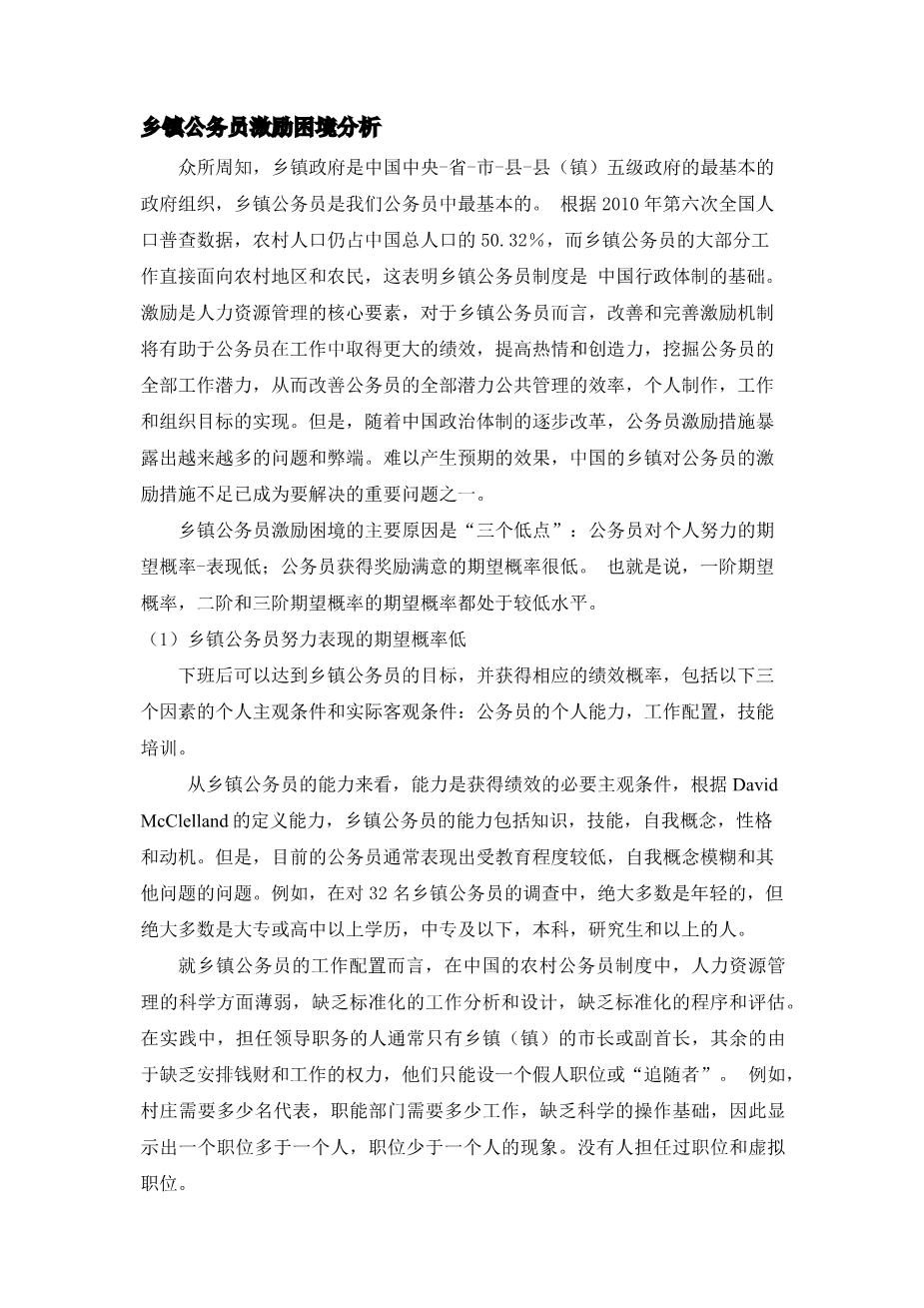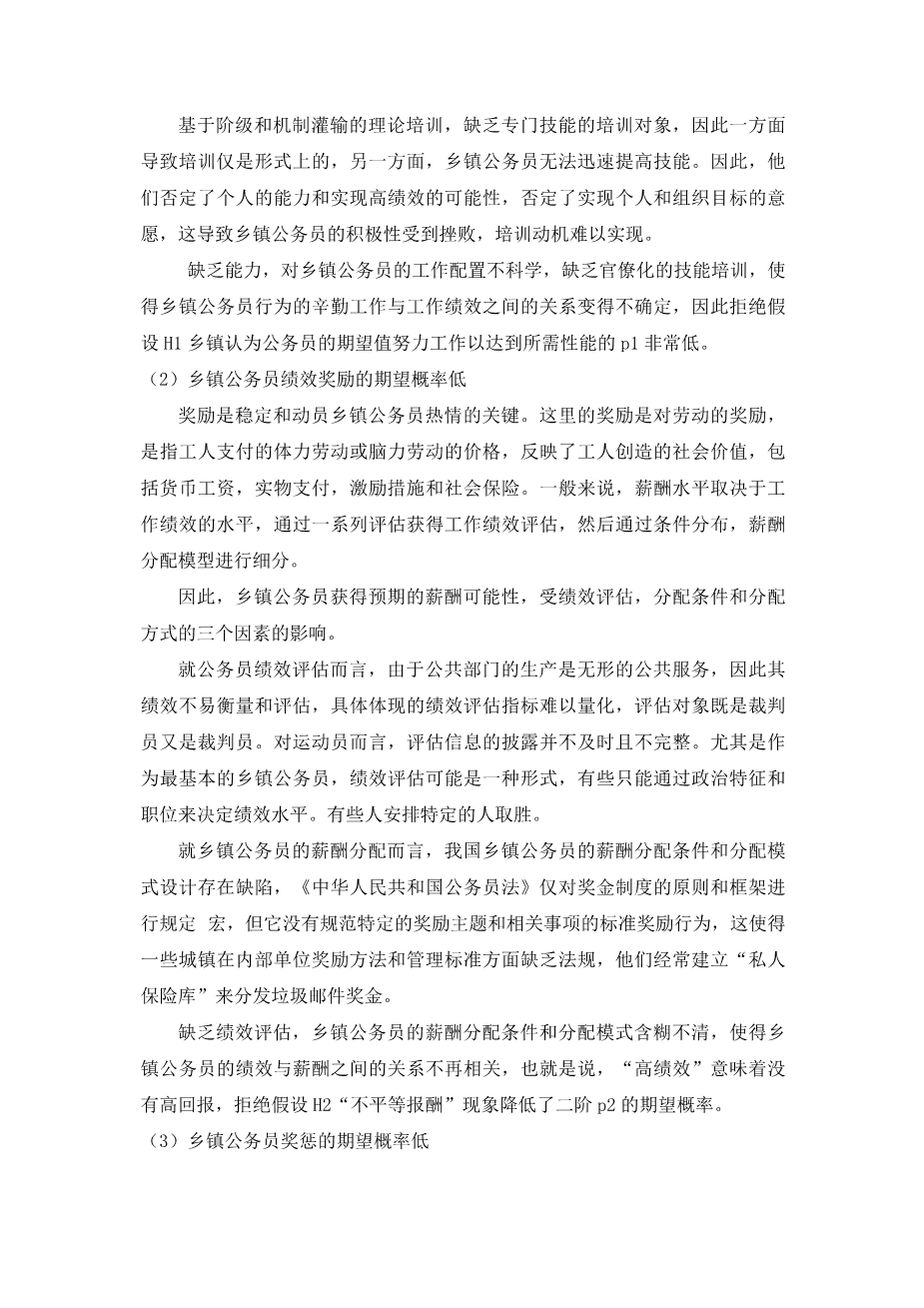

英语原文共 5 页,剩余内容已隐藏,支付完成后下载完整资料
Analysis of the incentive plight of the township civil servant
As we all know, the township government is the most basic governmental organizations of Chinese central - Province - City - County - township (town) five system of government, township civil servant is the most basic of our civil servants. According to the 2010 sixth national population census data, the rural population still accounts for 50.32% of Chinarsquo;s total population, while the most of the work of township civil servants is directly facing the rural areas and farmers, which shows the township civil service is the foundation of Chinarsquo;s administrative system. Motivation is a core element of human resource management, for the township civil servants, improve and perfect the incentive mechanism will help civil servants to achieve greater performance at work, increase enthusiasm and creativity of civil servants, tap civil servantsrsquo;s full work potential, which improve the efficiency of public administration, making personal, work and organizationalrsquo;s objectives achieved. However, as Chinarsquo;s political restructures step by step, accompanying with more and more problems and drawbacks exposed by incentives for civil servants. It is difficult to produce the desired effect, Chinarsquo;s township insufficient incentives for civil servants has become one of the important problems to be solved.
The main reason of the incentive plight of the township civil servant is the “three lows”: Civil servant expectations probability of individual effort - performance is low; civil servant expectations probability of reward-satisfaction is low. That is, the expectations probability of first-order, the expectations probability of the second-order and third-order expectations probability are all at a low level.
(1) Expectations probability of township civil servant effort–performance is low
Township civil servant targets can be met after work, and obtain the corresponding probability of performance, including personal subjective condition and actual objective conditions of the three factors: the individual ability of civil servants, job configuration, and skills training.
From capability of the township civil servant, the ability is a necessary subjective condition of obtaining performance, according to David McClellandrsquo;s ability to define, the township civil servantrsquo;s capacity includes knowledge, skills, self-concept, character and motivation. However, the current civil servant generally shows the problem of less educated, self-concept ambiguity and other issues. For example, in a survey of 32 township civil servants, the vast majority are young, but the vast majority are college or high school education, secondary and below, undergraduate, graduate and above is none.
As far as job configuration of township civil servants, in Chinarsquo;s rural civil servants system, the scientific aspects of human resource management is weak, lack of standardized job analysis and design, lack of standardized procedures and evaluation. In practice, in leadership positions and a “leader” is often only the township (town) mayor or deputy chief, the rest, because absence of power of arranging money and jobs, they can only set a dummy position or a “followers”. For example, how many deputies does a village need ,how many jobs does a functional department need, are the lack of scientific basis for operation, hence, shows the phenomenon of more than one people in one post, less than one people in a post, no one in a post and virtual position.
Theoretical training that is based on class and mechanism instilled, lack of specialized skills training counterparts, thus in one hand, lead to training a mere formality ,on the other hand, township civil servants canrsquo;t enhance the skills promptly. Therefore, they negate the ability of individuals and the possibility to achieve high performance, negate the achieve of personal and organizational goals, which lead to the enthusiasm of the township civil servants frustrated, so incentives of training difficult to achieve.
Lack of capacity, unscientific of job configuration and bureaucratic of skills training of the township civil servants, make the relationship between hard work of the township civil servants behavior and job performance uncertain, refused to assume H1 Township civil servants think that first-order probability expectations p1 of working hard to achieve the desired performance is very low.
(2) Expectations probability of township civil servants performance-reward is low
Reward is the key of stabling and mobilizing the enthusiasm of township civil servants. The reward here is the reward for labor, refers to the price the workers pay out the physical or mental work, which reflects social value the workers create, including money wages, in-kind payment, incentives and social insurance. In general, the level of remuneration depends on the level of job performance, and job performance evaluation is obtained through a series of assessments, and then segmentation by distribution of the conditions, remuneration allocation model.
Therefore, the township civil servants obtain the expected probability of pay, subject to three factors impact of performance evaluation, distribution conditions and the distribution pattern.
As far as the civil servant performance evaluation, because of the production of the public department is invisible public service, its performance is not easy to measure and evaluation, embodied the specific
剩余内容已隐藏,支付完成后下载完整资料
资料编号:[255291],资料为PDF文档或Word文档,PDF文档可免费转换为Word


